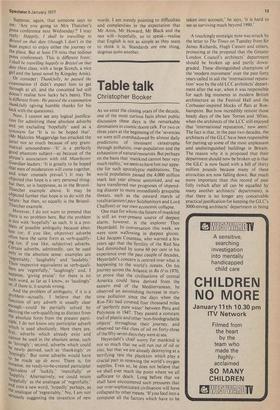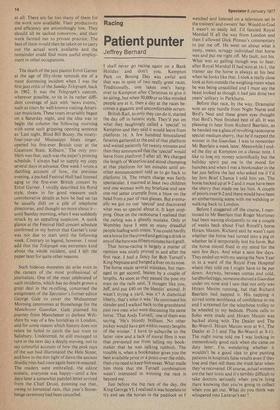Table talk
Christopher Booker As we enter the closing years of the decade, one of the most curious facts about public discussion these days is the remarkable diminution in cosmic doom talk. For two or three years at the beginning of the 'seventies we were still overshadowed by almost daily predictions of imminent catastrophe through pollution, over-population and the exhaustion of natural resources. But perhaps on the basis that 'mankind cannot bear very much reality,' we seem to have lost our appetite for such apocalyptic meditations. The woi Id population passed the 4,000 million mark last year almost unnoticed, and we have transferred our prognoses of in-mending disaster to more immediately graspable threats, such as the onward march of totalitarianism ( pace Solzhenitsyn and Lord Chalfont) or our own economic collapse.
One man for whom the future of mankind is still an ever-present source of deepest alarm, however, is the explorer Thor Heyerdahl. In conversation this week, we were soon wallowing in deepest gloom. Like Jacques Cousteau, who warned a few years ago that the fertility of the Red Sea had diminished by some 60 per cent in his experience over the past couple of decades, Heyerdahl's concern is centred over what is happening to the world's oceans. On his journey across the Atlantic in Ra II in 1970, to prove that the civilisations of central America could have derived from the eastern end of the Mediterranean, he observed an astonishing increase in maritime pollution since the days when the Kon-Tiki had covered four thousand miles of 'perfectly pure water' between Peru and Polynesia in 1947. They passed a constant trail of plastic and other 'non-biodegradable objects' throughout their journey, and observed tar-like clots of oil on forty-three of the fifty-seven days they were at sea.
Heyerdahl's chief worry for mankind is not so much that we will run out of oil or zinc, but that we are already destroying at a terrifying rate the plankton which play a crucial part in renewing the world's oxygen supplies. Even so, he does not believe that we shall ever reach the point where we all suffocate to death. Long before that we shall have encountered such pressures that our over-sophisticated civilisation will have collapsed by other means. 'If you feed into a computer all the factors which have to be
taken into account,' he says, 'it is hard to see us surviving much beyond 1990:
A touchingly nostalgic note was struck by the letter to The Times on Tuesday from Sir James Richards, Hugh Casson and others, protesting at the proposal that the Greater London Council's architects' department should be broken up and partly downgraded. These distinguished champions of the 'modern movement' over the past forty years called in aid the 'international reputation' won by the old LCC architects' department after the war, when it was responsible for such big moments in modern British architecture as the Festival Hall and the Corbusier-inspired blocks of flats at Roehampton. But how incredibly remote those heady days of the late 'forties and 'fifties, when the architects of the LCC still enjoyed that 'international reputation,' now seem! The fact is that, in the past two decades, the architects of the GLC have been responsible for putting up some of the most unpleasant and undistinguished buildings in Britain. The reason why it is proposed that their department should now be broken up is that the GLC is now faced with a bill of thirty million pounds because many of these attrocities are now falling down. But much more important than this record of past folly (which after all can be equalled by many another architects' department), is that there is no longer any conceivable practical justification for keeping the GLC's 3000-strong architects' department in being
at all. There are far too many of them for the work now available. Their productivity and efficiency are astonishingly low. They should all be sacked tomorrow, and their work farmed out to private practice. The best of them would then be taken on to carry out the actual work available and the remainder could find more useful employment in other occupations.
The death of the jazz pianist Errol Garner at the age of fifty-three reminds me of a most distressing incident when I was the first jazz critic of the Sunday Telegraph, back in 1962. It was the Telegraph's custom, wherever possible, to tie in its rather diffident coverage of jazz with 'news events,' such as tours by well-known visiting American musicians, These tours invariably began on a Saturday night, and the idea was to begin the column the following morning with some such gripping opening sentence as 'Last night, Blind Bill Boozy, the ninetyfour-year-old Mississippi blues singer, opened his first-ever British tour at the Gaumont State, Kilburn.' The only problem was that, such was the paper's printing schedule, I always had to supply my copy several days in advance. One week 1 wrote a dazzling account of how, the previous evening, a packed Festival Hall had listened agog to the first-ever British concert by Errol Garner. I vividly described his florid style, threw in for good measure such corroborative details as how he had sat (as he usually did) on a pile of telephone directories, and thought no more about it— until Sunday morning, when I was suddenly struck by an appalling suspicion. A quick glance at the Festival Hall concert schedule confirmed to my horror that Garner's tour was not due to start until the following week. Contrary to legend, however, I must add that the Telegraph was extremely kind about the whole incident, and I left the paper later for quite other reasons.
Such hideous moments do arise even in the careers of the most professional of journalists. One of the most celebrated of such incidents, which has no doubt grown a great deal in the re-telling, concerned the assignment of the Spectator's former editor George Gale to cover the Midsummer Morning ceremonies at Stonehenge for the Manchester Guardian. Gale planned his journey from Manchester to darkest Wiltshire by way of a few hostelries in London, and for some reason which history does not relate he failed to catch the last train to Salisbury. Undeterred, he still managed to turn in the next day a deeply moving, not to say colourful account of how the pink rays of the sun had illuminated the Hele Stone, and how in the dim light of dawn the ancient druidic rites had once again been re-enacted. The readers were enthralled, the editor ecstatic, everyone was happy—until a few days later a somewhat puzzled letter arrived from the Chief Druid, pointing out that, owing to torrential rain, that year's Stonehenge ceremony had been cancelled.



































 Previous page
Previous page